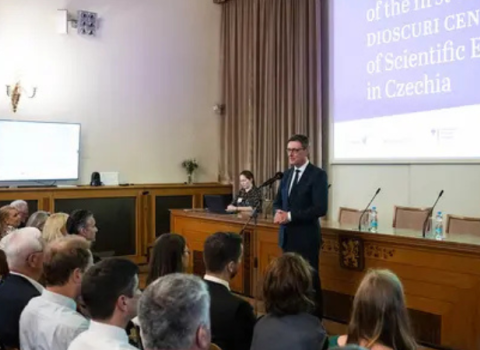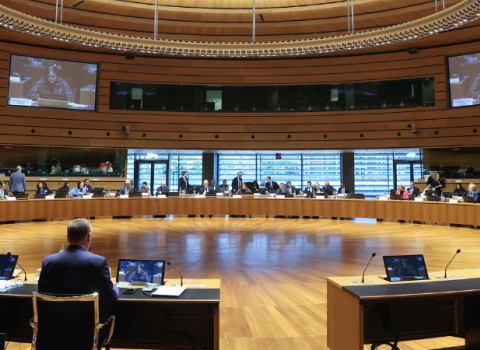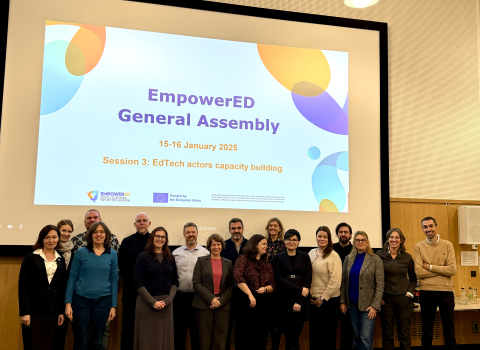A European Parliament resolution and Commission report paint a bleak picture of academic freedom in the candidate country

The Government building of the Republic of Serbia in Belgrade. Photo credits: only_point_five / Flickr
A damming European Parliament resolution on the state of democracy in Serbia has strongly condemned the government for curtailing academic freedom in the country. It calls on the authorities to “immediately restore financing to universities” and on institutions to “ensure the unhindered participation of the academic and research community in projects funded by the EU.”
But the move has sparked debate among the country’s embattled academics. While feeling persecuted by the increasingly authoritarian regime, they also fear that blanket sanctions from the west could make things even worse.
Published on October 22, the Parliamentary resolution came ahead of the one-year anniversary of a canopy collapse at a train station in Novi Sad, which killed 16 people and triggered mass student-led protests that are still ongoing.
Students accused the government of corruption and a cover-up. Their country-wide protests garnered support from many academics, who say this has led to government “revenge” by withholding university funding and replacing them in leadership positions.
The government has accused the protesters of being undemocratic revolutionaries funded by the west.
But many of the protesters’ claims have now been repeated in the European Parliament resolution, which describes “increased repression” and “serious concerns and evidence of widespread corruption linked to the ruling authorities.”
The resolution condemns the government’s “retaliation” against employees in the education and cultural sectors for supporting the protests, citing job losses, salary reductions, the presence of police on university campuses and the withdrawal of funding for public universities. It calls for an EU fact-finding mission to assess the “repression targeting students, academics, educators and public-sector employees.”
The resolution was followed on November 4 by a European Commission report on Serbia’s progress towards membership of the EU, which noted “worrying developments” and criticised “several governmental measures” that “interfered with the institutional autonomy of faculties and eroded academic freedom.”
A Commission spokesperson told Science|Business that Serbia “must ensure an enabling environment for researchers” and that academics must operate freely without undue restrictions.
“Academic Freedom and freedom of scientific research are at the core of the EU and its European Research Area,” they said. “Respect for these principles and values are therefore key elements of Serbia’s EU path.”
Related articles:
- Serbia’s academics outraged over limits to research, disappointed by EU response
- Serbia’s academics call for research chapter in EU accession process to be reopened
Shift in tone
Milka Sokolović, a biomedical scientist who heads the European Public Health Alliance, described the EU reports as “a long-overdue shift in tone” that “opens the door to targeted sanctions against those implicated in corruption or violence.”
“These are vital steps, but they must be followed through with consistency, visibility and genuine political will,” she said. “Europe’s message must be explicit: corruption and repression come at a price, and democracy is not negotiable.”
But the bloc has also used access to research funds to put pressure on governments. For example, it suspended talks with Switzerland in 2020 when the government there backed strict quotas for immigration from EU countries. And in 2022 it excluded Hungary’s public interest trusts from the Horizon and Erasmus programmes over concerns about rule of law.
But Serbian academics fear that research-related sanctions, such as those imposed on Hungary over rule-of-law concerns, could be unduly damaging.
“In no way should Horizon be suspended,” said Marina Kostić-Šulejić, research fellow at the Institute of International Politics and Economics from Belgrade. “The remaining links with the EU must be preserved.”
This is echoed by Sokolović, who said that broad or non-targeted sanctions, including those that touch the scientific or academic community, such as restricting participation in Horizon Europe or Erasmus+, would do more harm than good.
“They would primarily punish those already under state pressure: underfunded universities, researchers facing political interference, and students who have been at the forefront of peaceful protest,” she said.
“Academic and scientific cooperation remain among the few surviving bridges between Serbia and Europe,” she went on. “If we are to be romantic, they are rare spaces of truth, evidence, and critical thought. They should be protected, not penalised.”
There is also a concern that a EU fact-finding mission will remind a large part of the population of the western missions that led up to NATO bombing in 1999. These led to regime change but also killed civilians and destroyed vital infrastructure.
“By pressuring for fact-finding missions or restrictive measures, Serbs will feel pretty much like in the 1990s, which would lead them to further alienation from the EU and lower further the never-lower level of support for EU integration,” Kostić-Šulejić said.
What will change?
Others see the resolution as a positive, if overdue step, but worry that it won’t yield much on its own. “It is the strongest condemnation of the regime so far, but I do not believe it will have a major effect,” said Neven Isailović, senior research associate at the Institute of History in Belgrade.
He and others cite a range of ongoing problems in academia, such as salaries arriving with “at least seven days delay” and instances where the leaders of the state-owned scientific institutes who supported students have been replaced by people loyal to the regime.
The Trade Union of Science of Serbia issued a statement on October 8 saying the laws for the appointment of management boards and directors of institutes “have not been applied consistently” citing concerns about “the professional integrity and autonomy of scientific institutions.” Such appointments need to go to “researchers in appropriate titles, competent in the field of science that the institute deals with,” it went on.
“Frequent dismissals and appointments of acting directors do not contribute to the long-term stability of scientific research institutions, nor to their ability to fulfil their mission in the interest of society and the scientific community,” the union said.
Srđan Atanasovski, a union official and a senior researcher at the Serbian Academy of Sciences and Arts Institute for Musicology, said the statement was in response “to the arbitrary and retaliatory dismissals by directors and the re-composition of governing boards.”
Vladan Čokić, research professor at the University of Belgrade and a member of the Academic Solidarity and Engagement Network, said that other problems include the government “withholding or delaying payments of material costs” so that “faculties have fewer funds not only for research, but also for basic needs.”
Academic salaries are already the lowest in the region, he added, and the regime is planning policy changes that would restrict faculty income streams, putting them under more direct government control.
While he is also against general sanctions, he sees value in “direct personal sanctions” against members of universities loyal to the ruling party or government, and against those who publicly attack universities and their students and professors.
“Loyal deans who are aggressive towards students and colleagues are rewarded by the authorities. Those opportunistic professors should be sanctioned by EU, not allowing them to be part of EU-funded projects,” he said. “These sanctions should include bank accounts, their companies and a ban on visits to the EU.”
Similarly, he believes the EU must ensure that its funding and investment programmes do not unintentionally reinforce non-transparent institutions or allow corruption to flourish under the guise of EU support. So, it should better pair incentives such as funding and access to programmes with safeguards including monitoring and conditionality.
Science|Business has approached Serbia’s government for comment.





 A unique international forum for public research organisations and companies to connect their external engagement with strategic interests around their R&D system.
A unique international forum for public research organisations and companies to connect their external engagement with strategic interests around their R&D system.